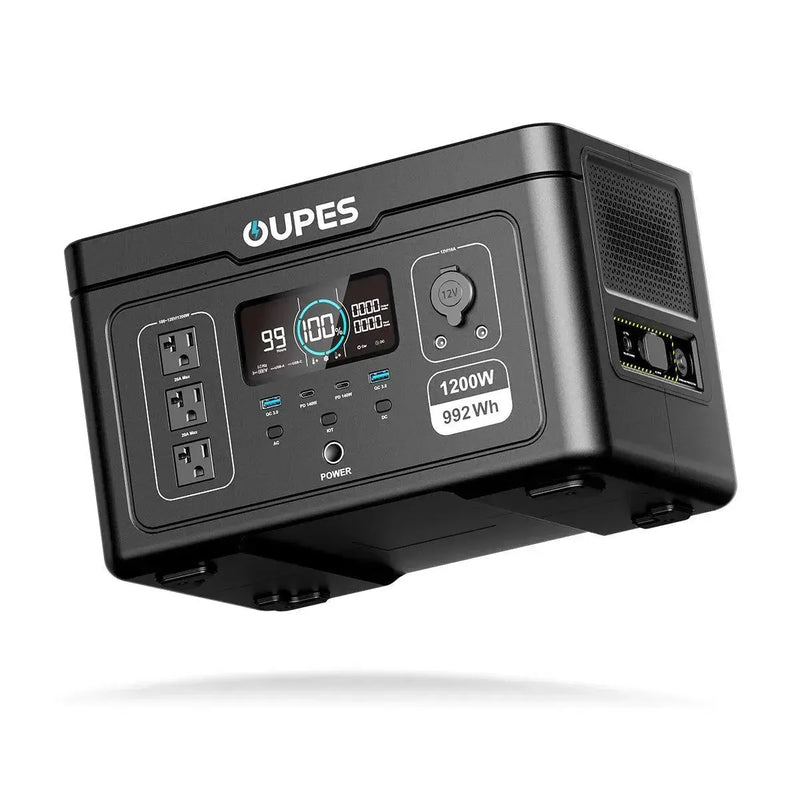
TL;DR / Key Takeaways
- Solar generators can power a house depending on capacity, inverter size, and battery storage.
- Larger units with expandable batteries are ideal for whole-home backup during outages.
- Solar integration reduces reliance on the grid and lowers energy costs.
- OUPES offers reliable, high-capacity solar generators tailored for residential power needs.
Introduction
As power outages and rising energy costs become more common, many homeowners are exploring solar generators as a reliable solution. These systems combine solar panels, batteries, and inverters to store and deliver electricity for residential use. According to the U.S. Energy Information Administration, renewable energy adoption is accelerating as households seek sustainable backup solutions.
Key Factors in Choosing a Solar Generator
- Battery Capacity: Determines how long the system can power your home during outages.
- Inverter Power: Indicates the maximum wattage of devices and appliances that can run simultaneously.
- Expandability: The ability to add extra batteries for extended use.
- Charging Options: AC, solar, and car charging compatibility for flexibility.
- Port Availability: Multiple AC, DC, and USB ports for varied household needs.
Understanding Capacity Requirements
The size of the solar generator you need depends on which appliances you intend to run. Below is an overview of average power consumption for common household devices:
| Appliance | Average Wattage | Daily Energy (kWh) |
|---|---|---|
| Refrigerator | 150–300 W | 1–2 kWh |
| LED Lighting (10 bulbs) | 80–100 W | 0.5 kWh |
| Television | 100–200 W | 0.6–1 kWh |
| Wi-Fi Router | 15–25 W | 0.2 kWh |
| Air Conditioner (Small Window Unit) | 500–1,000 W | 2–4 kWh |
Based on these numbers, a household may require 5–15 kWh of storage capacity per day for essential appliances.
Solar Generators vs. Traditional Backup Systems
| Feature | Solar Generator | Gas Generator |
|---|---|---|
| Fuel | Sunlight + Battery | Gasoline or Diesel |
| Noise | Silent | Loud |
| Emissions | Zero | CO₂ and fumes |
| Maintenance | Minimal | High (fuel, oil, servicing) |
| Indoor Safety | Safe | Unsafe |
Scenarios Where a Solar Generator Powers a House
Short-Term Outages
Solar generators can keep essential appliances like refrigerators, lights, and internet routers running for several hours to a day.
Multi-Day Outages
Systems with expandable battery packs can sustain households for multiple days, particularly when paired with solar panel input.
Off-Grid Living
Homeowners in remote areas use solar generators to maintain consistent energy supply without relying on grid infrastructure.
OUPES Whole-Home Solar Generator Solutions
OUPES provides solar generators designed for both partial and whole-home backup. With expandable battery modules, robust inverters, and high solar input capacity, OUPES systems are engineered to handle essential and heavy-duty household needs.
FAQ
Can a solar generator run an entire house?
Yes, with sufficient capacity and battery expansion, a solar generator can sustain whole-home power during outages.
How many solar panels are needed to power a home?
It depends on energy consumption, but typically 10–20 panels of 300–400 W each are required.
Can solar generators run air conditioners?
Yes, larger systems with powerful inverters can handle AC units, though energy consumption is significant.
How long do solar generators last?
Most units provide 3,000–3,500 charge cycles, offering up to 10 years of reliable use.
Are solar generators safe for indoor use?
Yes. Unlike gas generators, solar systems emit no fumes and operate silently indoors.
Conclusion
Solar generators have emerged as a viable alternative to traditional backup systems, offering clean, silent, and reliable energy for households. Whether preparing for outages or seeking to reduce grid reliance, OUPES solar generators provide the capacity and expandability needed to power entire homes sustainably.




























